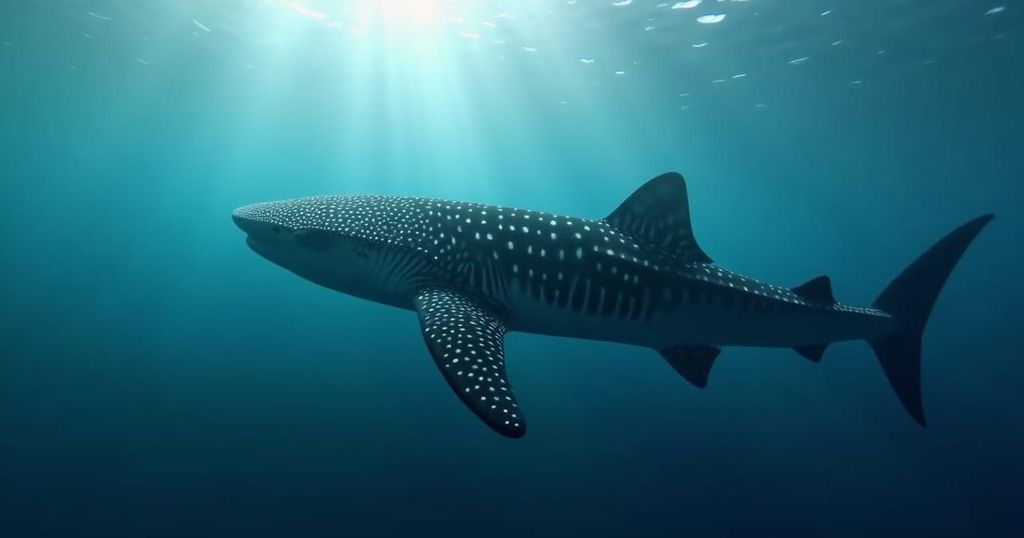A new study in *Nature Climate Change* predicts that climate change will significantly increase the risk of ship strikes on whale sharks by driving them into new habitats that intersect with shipping lanes. The research forecasts a staggering 15,000-fold increase in co-occurrence with large vessels by 2100, particularly under high-emission scenarios. Whale sharks are at risk of losing over 50% of their core habitats, especially in Asia. The study emphasizes the urgent need for integrated climate change mitigation strategies to protect this vulnerable marine species.
A recent study published in Nature Climate Change highlights that global warming poses an increasing threat to whale sharks from large shipping vessels. Researchers from the University of Southampton and the Marine Biological Association (MBA) project that rising ocean temperatures will compel these endangered creatures into new habitats that intersect with heavily trafficked shipping lanes. The study forecasts that the environmental scenario of whale shark and large ship co-occurrence may surge by as much as 15,000 times by the century’s end. Dr. Freya Womersley, the study’s lead author, emphasizes that the most significant habitat shifts for whale sharks occur under high emission scenarios, potentially leading to notable losses in their core habitats and an increase in ship interactions. Whale sharks, known to be highly mobile in response to temperature fluctuations, unfortunately exhibit heightened vulnerability to collisions with vessels, often leading to fatal injuries. Utilizing satellite-tracking data and global climate models, researchers assessed whale shark distribution under three distinct climate scenarios. The findings suggest that if high emissions persist—continuing reliance on fossil fuels—habitat losses of over 50% could occur in some national waters by 2100, particularly in Asia, while a sustainable development trajectory may help preserve habitats in other regions, notably Europe. The research integrated distribution mapping with shipping density data to ascertain the future interaction of whale sharks with maritime traffic. Results indicate that newly suitable habitats could coincide with busy shipping routes across various global locations, including parts of the North Pacific and Eastern China Seas. Even under circumstances of stable shipping traffic, the likelihood of whale sharks encountering large vessels is predicted to increase across all future climatic scenarios, not accounting for the projected escalation in shipping operations, which may rise by 1,200% by 2050. Dr. Womersley concluded that this study underscores the imperative of integrating climate change considerations into endangered species management strategies. With significant implications for marine conservation, Climate-driven global redistribution of an ocean giant predicts increased threat from shipping contributes to the growing awareness of how climate change exacerbates human impacts on marine species.
The study sheds light on how climate change reshapes ocean habitats, urging a reconsideration of marine wildlife management. Whale sharks, the largest fish species, face increasing risks of ship strikes as their habitats shift due to warming oceans. This phenomenon raises critical questions about biodiversity and conservation efforts in the context of escalating climate pressures. Researchers employed advanced methods, utilizing satellite data and climate models, to predict future scenarios for these marine giants. The need for urgent action against high carbon emissions and the adoption of sustainable practices is evident, as the survival of species like the whale shark hangs in the balance amidst significant ecological changes.
The findings of this study bring to the forefront a sobering reality regarding the consequences of climate change on marine life, specifically whale sharks. With projections suggesting severe habitat losses and increased risks from shipping traffic, it becomes crucial to adopt measures that mitigate climate impacts. Sustainable development and reduced carbon emissions will play vital roles in the conservation of whale sharks and other endangered marine species. Further research is warranted to monitor these shifts and to develop comprehensive management strategies aimed at protecting vulnerable marine ecosystems. In light of these predictions, recognizing the interconnectedness of climatic, ecological, and human factors is essential for effective conservation efforts.
Original Source: www.eurekalert.org







